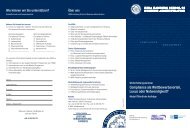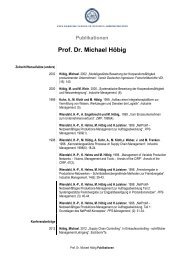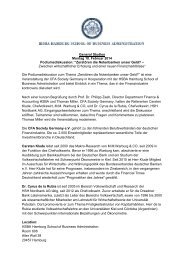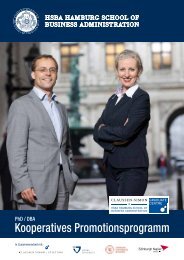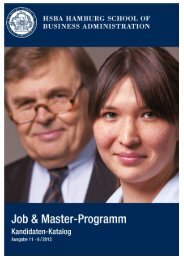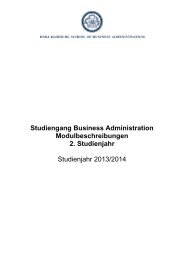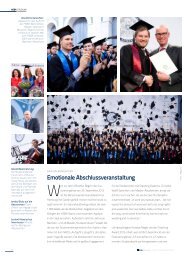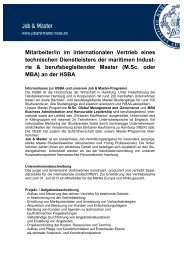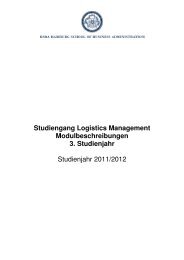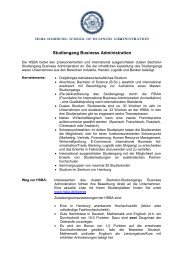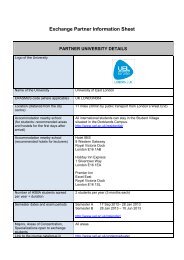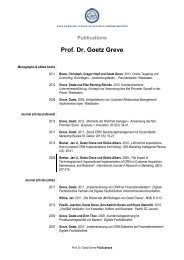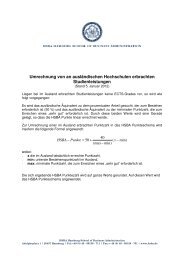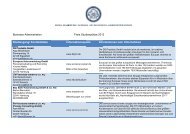Brochure PDF (4.2MB) - HSBA
Brochure PDF (4.2MB) - HSBA
Brochure PDF (4.2MB) - HSBA
You also want an ePaper? Increase the reach of your titles
YUMPU automatically turns print PDFs into web optimized ePapers that Google loves.
Global Management and Governance (M.Sc.)<br />
Part-time master’s degree programme with specialisations<br />
in Marketing, Finance or Entrepreneurship<br />
M.Sc.<br />
1
Contents<br />
Welcome 3<br />
Master’s degree programme in Global<br />
Management and Governance (M.Sc.) 4<br />
The course 5<br />
Guiding principles 6<br />
Module structure 7<br />
Course contents (modules) 8<br />
Specialisations 10<br />
Mentoring programme 15<br />
Lecturers 17<br />
Study conditions 18<br />
Hamburg as a location 19<br />
Course fees 20<br />
Admissions and application 21<br />
<strong>HSBA</strong> Hamburg School of<br />
Business Administration 22<br />
Photos: Michael Zapf, Roland Magunia, Karin Rose,<br />
Werner Gritzbach, Stefan Malzkorn.<br />
Last updated: March 2012
Welcome<br />
Improving career opportunities<br />
<strong>HSBA</strong>’s master’s degree programme with its generalist approach and its focus on internationality, business ethics and<br />
governance opens up a wide range of career opportunities for its graduates. Participants on the course benefit from<br />
excellent study conditions and a strong network in business and society.<br />
“With its master’s degree programme, <strong>HSBA</strong> provides<br />
a tailored offering for personnel development in<br />
companies. The concept of studying part-time<br />
combines a high-quality degree in business and<br />
economics with practical in-company training and<br />
opens up outstanding career opportunities for its<br />
graduates. The high share of case studies ensures<br />
that the course is always based on real-life scenarios<br />
and prepares future managers for the diverse<br />
challenges they will face in business.<br />
The course is based on the model of the “honourable<br />
merchant”, which promotes a focus on long-term<br />
business success. The high quality of <strong>HSBA</strong>’s course<br />
offering is reflected in its leading position in the CHE*<br />
ranking and the institutional accreditation by the<br />
German Council of Science and Humanities.”<br />
Prof. Dr. Hans-Jörg Schmidt-Trenz,<br />
President of <strong>HSBA</strong><br />
“We wish to offer our students excellent conditions for<br />
their master’s degree programme and give them the<br />
best career opportunities possible. A high level of<br />
organisational quality and the development of a global<br />
network are especially important to us.”<br />
Dr. Uve Samuels,<br />
CEO of <strong>HSBA</strong><br />
* Centrum für Hochschulentwicklung (Centre for University Development)<br />
“For the master’s degree programme in Global Management<br />
and Governance, we have succeeded in<br />
recruiting high-calibre professors and lecturers with a<br />
range of international experience. The contents of the<br />
course are divided into different modules, with the<br />
ideas of internationality, governance and business<br />
ethics forming a recurring theme throughout the entire<br />
course. In order to open up a wide spectrum of career<br />
opportunities for our graduates, our course initially<br />
takes a generalist approach. Toward the end of the<br />
course, there is an option to specialise in the essential<br />
specialist areas of Marketing, Finance or Entrepreneurship.”<br />
Prof. Dr. Stefan Prigge,<br />
Head of the master’s degree programme in<br />
Global Management and Governance (M.Sc.)<br />
“For hundreds of years, the credibility of the Hamburg<br />
merchant has been an international trademark for<br />
Hamburg as a location. The members of the Versammlung<br />
Eines Ehrbaren Kaufmanns zu Hamburg e.V.<br />
(VEEK) uphold and breathe life into this tradition in a<br />
modern context. VEEK supports <strong>HSBA</strong>’s master’s<br />
degree programme by assuming responsibility for the<br />
patronage and the mentoring programme because we<br />
feel particularly committed to supporting newcomers<br />
in line with our objectives.”<br />
Christian Dyckerhoff,<br />
Chairman of the Versammlung Eines Ehrbaren Kaufmanns zu<br />
Hamburg e.V., patron of the programme<br />
3
The master’s degree programme in Global Management<br />
and Governance (M.Sc.)<br />
Studying part-time at master’s degree level with students from all over the world<br />
4
The course<br />
Profile<br />
THE PRoCESS oF GLoBALISATIon has meant that<br />
the markets and production conditions relevant for<br />
individual businesses are changing at an everincreasing<br />
speed. now more than ever, businesses<br />
need managers and specialists who can master the<br />
challenges posed by this development.<br />
This is the inspiration for the part-time master’s<br />
degree programme in Global Management and Governance<br />
at <strong>HSBA</strong>. The aim of the course is to encourage<br />
future managers to think and act strategically and<br />
sustainably, thus laying an important cornerstone for<br />
professional success. As a result, the master’s programme<br />
combines theoretical specialist knowledge<br />
and established management concepts with the<br />
continuing development of personal skills.<br />
The course is open to graduates with degrees in<br />
business and economics, and leads to a Master of<br />
Science (M.Sc.) after a 30-month period. The course<br />
is taught in English. In order to always ensure the relevance<br />
of the course contents, <strong>HSBA</strong>’s teaching staff<br />
members include professors and external speakers of<br />
international renown from industry and academia who<br />
have extensive teaching and professional experience.<br />
The master’s degree programme in Global Management<br />
and Governance is a course with a generalist<br />
approach that covers a broad range of business<br />
administration theory as well as relevant economic and<br />
legal topics. In two modules at the end of the course,<br />
students can choose to specialise in Marketing,<br />
Finance or Entrepreneurship or to continue with the<br />
generalist nature of their course. This gives students<br />
the option of focusing up to 40% on a specialisation.<br />
The part-time study model means that the students<br />
remain integrated in their companies during the<br />
course. This allows them to contribute the knowledge<br />
acquired to their companies while simultaneously progressing<br />
their personal development and career. At<br />
the same time, the students can make a rich<br />
contribution to the course with experience from their<br />
companies.<br />
The master’s programme in Global Management and Governance (M.Sc.)<br />
Course start: 1 october of each year<br />
Duration: 30 months (including 6 months for the master´s thesis)<br />
Scope: approximately 750 hours of tuition<br />
ECTS: 120<br />
Form: The part-time course is conducted in full-time weeks and on extended weekends<br />
(Thursday to Saturday).<br />
Content: Application-oriented programme with solid scientific foundation in Business Administration<br />
issues with particular focus on internationality, business ethics and governance<br />
Patronage: Versammlung Eines Ehrbaren Kaufmanns e.V. zu Hamburg e.V.<br />
Mentoring programme: by the Versammlung Eines Ehrbaren Kaufmanns zu Hamburg e.V.<br />
Qualification: state-certified and internationally recognised Master of Science (M.Sc.)<br />
Accreditation:<br />
Eligibility for progression<br />
FIBAA (Foundation for International Business Administration Accreditation)<br />
to doctoral studies: Yes<br />
Size of seminar groups: max. 24 students<br />
Language: English<br />
Course fees: EUR 37,500 .<br />
It is possible to obtain funding through <strong>HSBA</strong>’s student support fund. Student loans are also<br />
available from banks cooperating with <strong>HSBA</strong>.<br />
Applicant profile: • Undergraduate degree in business/economics completed with the grade “good”<br />
• Ability to complete a course of studies in English<br />
• Letter of recommendation<br />
• Success in the selection process at <strong>HSBA</strong><br />
5
Guiding principles<br />
Internationality, business ethics and governance<br />
Global Management and<br />
Governance degree programme<br />
Three overarching principles that form the backbone of the course<br />
InTErnATIOnAlITy<br />
Internationality is one of the core ideas of the course.<br />
In each module, the topics covered will also always be<br />
looked at from an international perspective, for<br />
example when discussing international personnel<br />
management aspects or the role of global financial<br />
markets. The teaching concept consistently incorporates<br />
intercultural aspects, helping to establish internationality<br />
as an integral component of the course. In<br />
addition, the course involves one project that is carried<br />
out abroad (for example at Andrássy University in<br />
Budapest).<br />
A large number of the professors and lecturers<br />
have an international background or extensive international<br />
experience. our students also come from a<br />
range of different backgrounds, adding to the course’s<br />
multinational flair.<br />
<strong>HSBA</strong>’s master’s programmes also have an excellent<br />
reputation internationally. The november 2009<br />
issue of the US business magazine Forbes, for example,<br />
featured a select list of European business schools<br />
that included <strong>HSBA</strong>’s master’s programmes as a real<br />
alternative to US providers.<br />
BUSInESS ETHICS<br />
The course is under the patronage of the Versammlung<br />
Eines Ehrbaren Kaufmanns zu Hamburg e.V. (VEEK).<br />
The association promotes the concept that, within the<br />
scope of the respective laws, the generally accepted<br />
ethical standards and the principle of good faith in<br />
business transactions must be observed, while refraining<br />
from actions that are not compatible with the idea<br />
of trust in business dealings. VEEK has assumed the<br />
patronage for <strong>HSBA</strong>’s master’s degree programmes.<br />
This means that in addition to personal mentoring,<br />
6<br />
VEEK also supports the master’s programme by taking<br />
part in the selection process, awarding student grants<br />
and involving guest speakers from industry (in case<br />
studies for example). The curriculum centres on the<br />
theme of business ethics. Business ethics aspects are<br />
always considered in any discussion of business management<br />
issues.<br />
GOVErnAnCE<br />
Governance is the key concept in the research of<br />
Elinor ostrom and oliver E. Williamson, the 2009<br />
nobel Prize winners for Economics. In this context,<br />
governance means knowing, assessing and using<br />
different institutional and organisational alternatives.<br />
The course is not concerned with examining an<br />
abstract academic concept, but with looking at specific<br />
issues from real-life business scenarios. For<br />
example, how does eBay or Amazon manage to<br />
establish successful governance structures that make<br />
it possible for buyers and sellers on the internet to<br />
trust each other although they have never even met?<br />
How can successful governance structures be established<br />
in banks for fixed and variable renumeration and<br />
the liability of management board members and<br />
executives? In the individual modules, the course<br />
repeatedly places the focus on governance issues.
Module structure<br />
Course structure and module structure<br />
The structure at a glance<br />
Sequence of the modules and structure of a typical module<br />
120 ECTS MUST BE ACqUIRED over the course of<br />
the M.Sc. in Global Management and Governance.<br />
The credits are spread over twelve modules and the<br />
master’s thesis.<br />
30 months<br />
Course structure:<br />
7 9<br />
Term 4 Term 5 Term 6<br />
Financial Management Leadership &<br />
Human Resources<br />
Management<br />
Corporate 8Responsibility and 10 isation<br />
Corporate<br />
Communication<br />
Term 1<br />
1Decision-Making<br />
& Economic<br />
Behaviour<br />
Presence<br />
phase 1<br />
2<br />
3<br />
4<br />
Term 2<br />
Independent study<br />
phase 1<br />
• Introduction • Preparation for<br />
module events<br />
Master´s<br />
thesis<br />
(area of choice)<br />
Special-<br />
Elective<br />
Issues<br />
International Financial<br />
Reporting Standards<br />
& Corporate Governance<br />
Ethics, Compliance &<br />
Alternative Dispute<br />
Resolution Mechanisms<br />
Project<br />
Finance<br />
Marketing<br />
Entrepreneurship<br />
other<br />
Finance<br />
Marketing<br />
Entrepreneurship<br />
Module structure:<br />
Presence<br />
phase 2<br />
• opening exam<br />
• Lectures<br />
• Case studies<br />
• Guest lectures<br />
• Comprehensive case<br />
study<br />
• Reflection<br />
The first nine modules and module 12 are part of<br />
the general course of studies. In modules 10 and 11<br />
and in the master’s thesis, students can choose to<br />
specialise in Marketing, Finance or Entrepreneurship.<br />
Topical 11<br />
Finance<br />
Research<br />
Issues<br />
Marketing<br />
Entrepreneurship<br />
12<br />
5<br />
6<br />
Term 3<br />
Corporate Choice<br />
International<br />
Management<br />
International Politics<br />
and Economics<br />
Independent study<br />
phase 2<br />
• Following up on<br />
lectures<br />
• Preparation for<br />
exams<br />
Presence<br />
phase 3<br />
Internationality<br />
• End-of-module exams<br />
Business Ethics<br />
Governance<br />
7
Course contents<br />
Core modules<br />
Course modules<br />
Twelve modules and then the master’s thesis<br />
Module 1: Decision-Making and Economic Behaviour<br />
Students familiarise themselves with the different concepts<br />
in economics relating to human behaviour in<br />
organisations and learn to evaluate different incentive<br />
systems. The following approaches are covered:<br />
Decision theory<br />
Game theory<br />
new institutional economics<br />
Behavioural economics<br />
Model of the honourable merchant<br />
Module 2: International Financial reporting Standards &<br />
Corporate Governance<br />
Students acquire knowledge of international financial<br />
reporting and auditing standards and of their significance<br />
for corporate governance. They additionally<br />
learn about other important issues in relation to corporate<br />
governance (= the totality of all matters influencing<br />
how businesses make decisions concerning the use of<br />
resources), e.g. incentives and monitoring of management,<br />
shareholder versus stakeholder models or the<br />
international development of corporate governance<br />
structures. The module comprises the following<br />
submodules:<br />
International financial reporting and auditing<br />
standards<br />
Corporate governance<br />
Module 3: Ethics, Compliance & Alternative Dispute resolution<br />
Mechanisms<br />
The module teaches the elements of business ethics<br />
and their significance for long-term business success.<br />
Students learn about the following areas:<br />
Fundamentals of business ethics philosophy<br />
Development of a compliance organisation as a<br />
part of risk management<br />
Alternative out-of-court dispute resolution<br />
mechanisms<br />
8<br />
Module 4: Project<br />
As part of the project work, students develop solutions<br />
to specific business problems. The topic is set by a<br />
cooperating company and is of an international nature.<br />
The project is carried out abroad at a partner university<br />
of <strong>HSBA</strong> and is performed on site for the duration of<br />
one compact week, with preparatory research having<br />
been undertaken in advance at <strong>HSBA</strong>. The result of<br />
the project work is assessed by the company sponsoring<br />
the project.<br />
Module 5: International Management<br />
The module familiarises students with the consequences<br />
for a company of entering the international<br />
market (also taking international and cultural differences<br />
into account). They put what they have learned<br />
into practise in a project on a related topic. The focus<br />
is on the following aspects:<br />
Intercultural communication<br />
Procurement (international management)<br />
Sales (international marketing)<br />
Production (global logistics and supply chain<br />
management or production and quality management)<br />
Module 6: International Politics and Economics<br />
In this module, students acquire the skills needed to<br />
evaluate the overall business environment, including<br />
the following individual topics:<br />
Market mechanisms<br />
Market failure and<br />
International economic policy and<br />
European integration
Module 7: Financial Management<br />
The module teaches students how to evaluate and<br />
compare alternative investment projects or financing<br />
options on the basis of reliable information. Accordingly,<br />
the following topics are covered:<br />
Markets as decision environments – as seen in<br />
institutional economics and behavioural finance<br />
Business valuations<br />
Investor relations<br />
Finance case study<br />
Module 8: Corporate responsibility and<br />
Corporate Communication<br />
In this module, students acquire a basic understanding<br />
of CR and sustainability and learn how social,<br />
ecological and economic aspects can be used to<br />
develop a company-specific strategy. In detail, the<br />
following topics are covered:<br />
Appropriate communication of CR engagements<br />
Aspects of corporate public relations and public<br />
affairs<br />
Case study on the entire spectrum of CR and<br />
corporate communication<br />
Module 9: leadership & Human resources Management<br />
Students familiarise themselves with human resources<br />
and management concepts in an international context<br />
and learn how to apply these in a business setting. one<br />
part of the module aims to improve students’ personal,<br />
communication and social skills. The focus is on:<br />
Leadership theories<br />
Human resources in international companies<br />
Human resources development on an international<br />
scale<br />
Personal and social skills for executives<br />
Diversity management<br />
Module 10 and 11: Specialisation – Elective and Topical<br />
research Issues<br />
Students can specialise in Finance, Marketing or Entrepreneurship<br />
or choose to focus on the generalist nature<br />
of the course by combining a number of different topics.<br />
More information on the specialisations is available on<br />
page 10 et seq.<br />
Module 12: Corporate Choice<br />
This module summarises the issues covered by the<br />
course in a two-day case study. The different perspectives<br />
from the previous modules are weighed up<br />
against each other in order to simulate a complex<br />
decision-making process and arrive at balanced and<br />
realistic decisions.<br />
9
Specialisations<br />
Marketing<br />
Marketing specialisation<br />
Scientifically proven marketing concepts for real life<br />
THE MARKETInG SPECIALISATIon deals in depth<br />
with three core aspects of marketing. In all three parts,<br />
scientific models are introduced that serve to quantify<br />
interrelations in marketing. Part 1 shows how to<br />
measure consumer preferences and use the results for<br />
the product innovation process. Part 2 focuses on the<br />
customer, introducing students to the fundamental<br />
concepts in value-based customer management. It<br />
makes particular use of customer lifetime value<br />
models.<br />
The third part is dedicated to monitoring all marketing<br />
activities in a company. This involves discussing<br />
established models and new models alike and testing<br />
their usability. The aim is to develop approaches that<br />
contribute to better quantification of the return on<br />
marketing.<br />
10<br />
Our Marketing specialisation module<br />
is kindly supported by:<br />
kempertrautmann gmbh<br />
Scholz & Friends Brand Affairs GmbH<br />
otto Group<br />
Montblanc International GmbH<br />
Hyve AG<br />
”In a globalised economy, marketing is<br />
becoming more and more important. We<br />
give our students an excellent opportunity<br />
to explore cutting-edge marketing tools to<br />
further develop their management skills.“<br />
Prof. Dr. Goetz Greve, <strong>HSBA</strong><br />
“Understanding and creatively applying the<br />
latest marketing knowledge is of fundamental<br />
importance in today’s competitive markets.”<br />
Dr. Michael Trautmann,<br />
kempertrautmann gmbH, Managing Director
Specialisations<br />
Finance<br />
Finance specialisation<br />
Focus on valuation, derivatives and<br />
company acquisitions<br />
THE FInAnCE SPECIALISATIon MoDULE carries on<br />
from the Financial Management module and focuses<br />
at an advanced level on the ability to value projects,<br />
shares and entire companies. The first part comprises<br />
an in-depth look at general valuation issues. The<br />
second part explains the valuation of derivatives and<br />
illustrates how they can be used in risk management.<br />
The third part focuses on the purchase and sale of<br />
companies and business divisions. The success or<br />
failure of a company acquisition depends on many of<br />
the aspects covered in previous modules. This allows<br />
students to apply their knowledge from prior modules.<br />
Last but not least, the final part of the module examines<br />
the legal aspects of financial instruments and<br />
financial transactions.<br />
Our Finance specialisation module<br />
is kindly supported by:<br />
Hamburger Sparkasse<br />
Finanzplatzinitiative Hamburg<br />
Hamburger Volksbank e.G.<br />
Beiersdorf AG<br />
Commerzbank AG<br />
KPMG AG<br />
Wirtschaftsprüfungsgesellschaft<br />
Hawesko Holding AG<br />
Euler Hermes Kreditversicherungs-AG<br />
“Identifying investment projects that<br />
increase value and M&A strategies are<br />
the core tasks of managerial finance.<br />
This requires a thorough understanding<br />
of how capital markets work and makes<br />
knowledge of relevant (business) valuation<br />
methods essential. Derivatives, risk<br />
management and investor relations are<br />
also part of the finance curriculum.”<br />
Prof. Dr. Jens-Eric von Düsterlho, <strong>HSBA</strong><br />
“Superior financial, legal and tax structuring<br />
is a key factor in economic success. It is<br />
vital to integrate these planning activities in<br />
your own corporate strategy. This is how<br />
you can take the lead using an entrepre -<br />
neurial approach.”<br />
Hans-Henning Bernhardt,<br />
Beiersdorf AG, General Counsel<br />
11
Entrepreneurship specialisation<br />
The lifecycle of a company from start-up to growth and succession planning<br />
THIS SPECIALISATIon covers Entrepreneurship in a<br />
broad-based manner, starting with company start-ups<br />
and the management of small and medium-sized<br />
enterprises right through to innovation management<br />
and the creation of new companies within corporate<br />
groups.<br />
The business idea and the entrepreneur take centre<br />
stage. The first part, on Foundation of Entrepreneurship<br />
and Business Modelling, lays the foundation<br />
for entrepreneurial objectives and activities. These<br />
include life cycle analysis and management and the<br />
different concepts for business models as well as their<br />
12<br />
logic and implementation in a business plan. The<br />
sections on SME Management and Family owned<br />
Businesses deal specifically with the needs of smaller,<br />
medium-sized and family-oriented businesses. These<br />
incorporate aspects of management, continuous management<br />
and succession planning, and are also<br />
viewed from a corporate governance perspective. The<br />
Corporate Venturing section looks at the specific<br />
circumstances of establishing new corporate activities<br />
within an existing group or in a separately formed<br />
entity. Legal and financial aspects are also covered.<br />
The section on Innovation and Growth Management
examines the new business activities of existing companies<br />
and/or processes. It focuses among other<br />
things on safeguarding the intangible assets created<br />
by the company, such as brands, patents and other<br />
intellectual property.<br />
Internationalisation strategies are also discussed.<br />
The Change Management part examines critical<br />
business situations that lead to downsizing, restructuring<br />
or even business failure. In this part of the specialisation,<br />
students learn how to handle difficult business<br />
situations. once again, corporate governance aspects<br />
are also taken into account.<br />
Specialisation<br />
Entrepreneurship<br />
Our Entrepreneurship specialisation<br />
is kindly supported by:<br />
Putz & Partner Unternehmensberatung AG<br />
Roland Berger Strategy Consulting GmbH<br />
“From an entrepreneurial perspective, our<br />
students learn a lot through challenging<br />
and complex cases on how to start up,<br />
develop and build successful companies<br />
of different sizes.”<br />
Prof. Dr. Christoph Bauer, <strong>HSBA</strong><br />
“Entrepreneurship is one of the most<br />
important factors for success in fastgrowing<br />
SMEs. They are lucky enough to<br />
have a rapidly development and dynamic<br />
environment right here in Hamburg.”<br />
Andreas Bartmann,<br />
Globetrotter-Ausrüstung, Denart &<br />
lechhart GmbH, Managing Director<br />
13
Mentoring programme<br />
Under the patronage of the Versammlung Eines Ehrbaren Kaufmanns zu Hamburg<br />
The mentors<br />
Well-known businesspeople in Hamburg provide<br />
individual support throughout the course<br />
STUDEnTS on A MASTER’S programme at <strong>HSBA</strong><br />
benefit in particular in their personal and professional<br />
development from a special mentoring programme<br />
involving members and partners of the Versammlung<br />
Eines Ehrbaren Kaufmanns zu Hamburg e.V. (VEEK).<br />
The association embodies typical Hanseatic values<br />
that have helped merchants in Hamburg to trade and<br />
offer services successfully for centuries and that are<br />
still just as relevant in today’s business world. Experienced<br />
entrepreneurs affiliated to VEEK act as<br />
mentors, supporting and accompanying the <strong>HSBA</strong><br />
master’s students on their path to the management<br />
levels of business.<br />
The master’s students at <strong>HSBA</strong> are permanent<br />
guests of VEEK for the duration of their course and<br />
can attend all of its events and committee meetings.<br />
This gives <strong>HSBA</strong> master’s students a unique opportunity<br />
to benefit from the vast wealth of experience and<br />
networks of Hamburg’s entrepreneurs in addition to<br />
their excellent course of studies.<br />
“Young people have enormous challenges ahead of them.<br />
Experience is a good navigator in finding the right path to<br />
success in the jungle of networks, competitive pressure, job<br />
offers, information and media. In the mentoring process, I see<br />
myself as a navigation device that indicates a path. But it is the<br />
mentee who ultimately steers the course.”<br />
Minou Tikrani,<br />
Managing Partner of Konstruktiv Pr-Beratungsgesellschaft mbH,<br />
mentor and VEEK member<br />
“As a mentor for the <strong>HSBA</strong> master’s programme, I am<br />
personally committed to passing on my experience to young<br />
people and to supporting them in their personal and<br />
professional development.”<br />
reinaldo Udewald,<br />
Managing Partner of WECO Consult GmbH,<br />
mentor and VEEK member<br />
15
Blindtexten Weg nach Hamburg<br />
gefunden und tragen<br />
Blindtex<br />
16
lecturers<br />
on the M.Sc. programme<br />
Some of our lecturers<br />
More than 40 lecturers from academia and industry are involved in teaching on the course. They come from a wide<br />
range of international backgrounds and have extensive professional experience. The following are just some of the<br />
lecturers in charge of the lectures:<br />
Prof. Dr. Stefan Prigge<br />
(Course Head)<br />
Professor at <strong>HSBA</strong> Hamburg School<br />
of Business Administration<br />
– Corporate governance<br />
– Regulation of the financial sector<br />
– Capital markets<br />
– Law and economics<br />
– Family-owned companies<br />
Prof. Dr. Philipp Zaeh<br />
Professor at <strong>HSBA</strong> Hamburg School<br />
of Business Administration<br />
– International (group) Financial Reporting<br />
Standards (IFRS) and International<br />
Standards on Auditing (ISA)<br />
– Business valuations according to<br />
national and international standards<br />
– Valuation of intangible assets<br />
– Internal audit and risk-oriented<br />
auditing of financial statements<br />
– Cost management<br />
Dr. nils Krause<br />
Partner at DLA Piper UK LLP<br />
– M&A transactions<br />
– Corporate law<br />
– Corporate governance and<br />
corporate compliance<br />
Prof. Dr. Stefan Okruch<br />
Vice Chancellor of Andrássy University<br />
Budapest<br />
– new institutional economics &<br />
behavioural economics<br />
– Law & economics<br />
– Competition policy<br />
– European integration<br />
– Policy learning<br />
Prof. Dr. André Küster Simić<br />
Professor at <strong>HSBA</strong> Hamburg<br />
School of Business Administration<br />
– Capital markets, financing and<br />
investment<br />
– Ship financing<br />
– Business taxation<br />
Prof. Dr. Washika Haak-Saheem<br />
Assistant Professor, oB & IBM<br />
College of Business Administration,<br />
University of Dubai<br />
- Cross-cultural management<br />
- Leadership & organisational<br />
change<br />
- organisational behaviour<br />
17
Study conditions<br />
at <strong>HSBA</strong><br />
18<br />
Studying at <strong>HSBA</strong><br />
The campus, teaching concept and organisation of the<br />
university<br />
THE BRIGHT AnD FRIEnDLY atmosphere of our<br />
Handelskammer City Campus with its state-of-the-art<br />
technical equipment provides students with the best<br />
possible conditions for learning. Students have access<br />
to one of the oldest libraries for business and economics<br />
in the form of the Commerzbibliothek, which<br />
belongs to Hamburg’s Chamber of Commerce. Direct<br />
access to course-relevant literature is ensured through<br />
the specially established branch of the Commerzbibliothek<br />
library on our City Campus.<br />
<strong>HSBA</strong>’s teaching concept is based on a personal<br />
atmosphere between the teaching staff and the students.<br />
For this reason, seminars are organised in small<br />
groups. When selecting our teaching staff, we place<br />
great emphasis on combining academic excellence<br />
with practical relevance. The professors at <strong>HSBA</strong> are<br />
highly qualified experts in business and economics<br />
who have many years of professional business experience.<br />
In addition, practitioners and experts from our<br />
partner firms also lecture at <strong>HSBA</strong>.<br />
quality management is at the core of <strong>HSBA</strong>’s<br />
organisational structure. <strong>HSBA</strong> strives for continuous<br />
quality assurance and further development by means<br />
of comprehensive evaluations carried out amongst our<br />
students and cooperating companies. As a comparatively<br />
small university, we take advantage of direct<br />
communication channels. our staff in university<br />
management are always happy to hear from students<br />
with questions, criticism or suggestions.
Hamburg as a location<br />
The gateway to the world<br />
Studying and living in Hamburg<br />
A place with a good quality of life<br />
<strong>HSBA</strong> IS A UnIVERSITY in the heart of the City of Hamburg.<br />
our university is located centrally, directly adjacent<br />
to the city hall and Hamburg’s Chamber of Commerce,<br />
at the hub of the city’s social and economic life.<br />
Hamburg is considered to be one of Europe’s most<br />
beautiful cities. And with good reason: as a vibrant<br />
harbour in a unique location between two seas and with<br />
excellent leisure options, the city offers a very good<br />
quality of life.<br />
As a seaport, Hamburg is traditionally one of Germany’s<br />
most important locations for foreign trade as<br />
well as a leading financial centre. Also an important<br />
location for industry, Hamburg ranks alongside Seattle<br />
and Toulouse as a leader in civil aviation. In addition,<br />
Hamburg not only has a rich publishing tradition, but<br />
has also made a name for itself in creative advertising.<br />
This mix of economic potential and a good quality of life<br />
makes Hamburg one of Europe’s most dynamic business<br />
regions.<br />
Hamburg’s diversity and vital force is also reflected<br />
in the city’s cultural life. From musicals, cabaret and<br />
theatre to a vibrant club scene, local cultural centres<br />
and galleries and museums – Hamburg has a lot to<br />
offer. nevertheless it is easy to find a place to relax in<br />
this green metropolis. Almost half of Hamburg is taken<br />
up by parks and green spaces, water and wooded<br />
areas. The city has more trees than inhabitants and five<br />
times as many bridges as Venice. It’s easy to feel at<br />
home in Hamburg, which is why the city has become a<br />
popular place to live for many people from other parts of<br />
Germany and from abroad in recent years.<br />
one of the factors that contribute to Hamburg’s<br />
good quality of life is how safe it is. In an international<br />
comparison, Germany ranks well above other European<br />
countries such as France or the UK in terms of safety.<br />
The identity of a cosmopolitan city like Hamburg also<br />
encompasses ensuring the safety of all of its residents.<br />
Every student is in good hands in Hamburg.<br />
19
Course fees<br />
Funding and student grants<br />
<strong>HSBA</strong> HAS SET ITSELF the goal of supporting particu-<br />
larly gifted applicants who require financial assistance<br />
in order to attend the master’s degree programme at<br />
<strong>HSBA</strong>. Every year, <strong>HSBA</strong> awards student grants as<br />
part of its funding scheme. Under this scheme, financial<br />
assistance amounting to between 25 and 50% of<br />
the course fees can be awarded to particularly needy<br />
or particularly worthy candidates.<br />
Further information on course fees and on the<br />
conditions for funding is available on our website<br />
(www.hsba.de).<br />
20<br />
Further support is available from organisations<br />
affiliated with <strong>HSBA</strong>. For example, several full scholarships<br />
for master’s degree programmes are awarded<br />
each year by Commerz Collegium zu Altona (a traditional<br />
association of businesspeople in the Hamburg<br />
district of Altona), VDI Verein Deutscher Ingenieure<br />
Hamburg (the Hamburg branch of the Association of<br />
German Engineers) and Verein der Freunde und Förderer<br />
der <strong>HSBA</strong> (an association of <strong>HSBA</strong> sponsors).<br />
Another option is to reach an agreement with the<br />
employer on sharing the remaining cost of course fees.
Admissions and applications<br />
Getting started<br />
WITH ITS CoURSE oFFERInG, <strong>HSBA</strong> is geared<br />
toward particularly well-qualified applicants.<br />
Acceptance onto the graduate master’s degree programme<br />
in Global Management and Governance is<br />
subject to the following prerequisites:<br />
A completed third-level degree in economics or business<br />
covering 180 ECTS credits. The third-level<br />
degree should have been completed with a minimum<br />
grade “good” (2.5).<br />
Ability to complete a course of studies in English (minimum<br />
level: B2 of the European Framework of Reference)<br />
Letter of recommendation from a current or former<br />
employer or an academic reference<br />
Successfully completed <strong>HSBA</strong> selection process (written<br />
application, telephone interview, admission day)<br />
Step 1: Written application<br />
The application for the M.Sc. study programme Global<br />
Management and Governance takes place in written<br />
form (either postal or via e-mail to alexander.freier@<br />
hsba.de). The application must include cover letter,<br />
letter of recommendation, curriculum vitae and copies<br />
of certificates are required.<br />
Step 2: Telephone interview<br />
After reviewing the documents, a 30-minute telephone<br />
interview takes place to discuss the student’s motivation<br />
and all queries surrounding the course.<br />
Step 3: Admission day<br />
Admission day runs for one day and involves an<br />
in-depth assessment of the applicant’s personal and<br />
academic suitability. Admission day takes place once<br />
a month in Hamburg.<br />
Written<br />
application<br />
Telephone<br />
interview<br />
Admission<br />
day<br />
Step 4: Acceptance<br />
The applicant is informed in writing of the vote by the<br />
acceptance commission. If there are still places available,<br />
a contractual offer is made to the successful<br />
applicant. If there are no places left, the applicant is<br />
offered a place for the following year.<br />
Step 5: Job & master’s placement if applicable<br />
As part of our job & master’s placement offering, we<br />
help candidates to find a suitable company. <strong>HSBA</strong>’s<br />
partner firms specifically use this programme to recruit<br />
employees for a long-lasting working relationship.<br />
Step 6: Signing the contract<br />
A place is reserved on the course for the applicant<br />
after he/she has signed the contract. Welcome to<br />
<strong>HSBA</strong>!<br />
Applications can be made at any time. Because <strong>HSBA</strong><br />
only awards 24 places each year, we recommend that<br />
applications are submitted as early as possible.<br />
Acceptance<br />
Job & master’s<br />
placement if<br />
applicable<br />
Signing the<br />
contract<br />
21
<strong>HSBA</strong> Hamburg School of Business Administration<br />
Who we are<br />
your contact person at <strong>HSBA</strong>:<br />
<strong>HSBA</strong> Hamburg School of<br />
Business Administration<br />
Alexander Freier<br />
Head of Relationship Management<br />
Alter Wall 38<br />
20457 Hamburg<br />
Telefon: +49 40 36 138-743<br />
Telefax: +49 40 36 138-751<br />
E-Mail: alexander.freier@hsba.de<br />
Internet: www.hsba.de<br />
<strong>HSBA</strong>’s profile<br />
Courses offered, values and guiding principles<br />
<strong>HSBA</strong> HAMBURG School of Business Administration<br />
is the university for business in Hamburg. Under the<br />
auspices of Hamburg’s Chamber of Commerce,<br />
<strong>HSBA</strong> offers dual bachelor’s and part-time master’s<br />
degrees in business for more than 600 students. We<br />
have around 200 cooperating companies, which are<br />
involved in designing and developing our courses in<br />
order to ensure that they are constantly aligned with<br />
business needs.
<strong>HSBA</strong> Hamburg School of Business Administration<br />
Who we ware<br />
This means that <strong>HSBA</strong> graduates are perfectly<br />
prepared for the requirements of business and have<br />
excellent career opportunities.<br />
Dual bachelor’s degrees<br />
B.Sc. in Business Administration<br />
B.Sc. in Logistics Management<br />
B.Sc. in Media Management<br />
B.Sc. in Maritime Management<br />
Part-time master’s degrees<br />
M.Sc. in Global Management & Governance<br />
MBA in Business Administration &<br />
Honourable Leadership<br />
MBA in Shipping<br />
High-quality education for specialists and executives,<br />
applied research and advice round off <strong>HSBA</strong>’s offering.<br />
Excellent ranking results, the course accreditations by<br />
the FIBAA (Foundation for International Business<br />
Administration Accreditation) as well as the institutional<br />
accreditation by the German Council of Science<br />
and Humanities testify to the high quality of our university.<br />
<strong>HSBA</strong> is strongly influenced by the model of the<br />
honourable merchant, whose entrepreneurial dealings<br />
lead to success in business and who also assumes<br />
social responsibility. Consequently, <strong>HSBA</strong> summarises<br />
its actions under the motto of “Success through performance<br />
– responsibility – fairness”.<br />
<strong>HSBA</strong>’s main concern is to mould its students into<br />
ethical, cosmopolitan people with strong professional<br />
and methodological expertise and soft skills, who can<br />
benefit from outstanding employment opportunities<br />
after graduating from <strong>HSBA</strong>. In the cosmopolitan city<br />
of Hamburg with its global orientation, the focus is<br />
also on developing students’ international skills.<br />
With its relevant courses, applied research and<br />
high-quality education offerings, <strong>HSBA</strong> is endeavouring<br />
to become one of Germany’s leading business<br />
schools, true to its motto of:<br />
<strong>HSBA</strong> – The Gateway to Management Excellence<br />
In this context, “Management Excellence” stands for<br />
dedication, performance, reliability and integrity.<br />
23
<strong>HSBA</strong> Hamburg School of Business Administration<br />
Alter Wall 38 · 20457 Hamburg<br />
Telefon: +49 40 36 138-711 · Telefax: +49 40 36 138-751<br />
info@hsba.de · www.hsba.de



